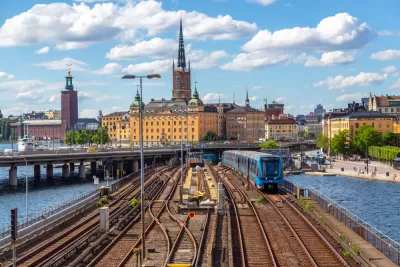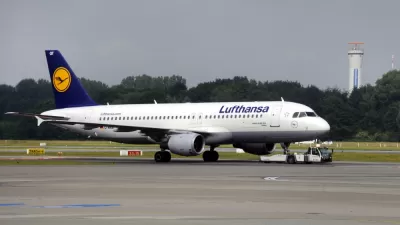A greener life means fewer flights for many Europeans.

Lisa Abend reports on the growing popularity of train travel over air travel among an increasingly eco-conscious European population:
This is the season of flygskam, or “flight shame.” You don’t have to be Greta Thunberg, the teenage climate activist who recently announced plans to sail to New York in August, to recognize that a growing number of Europeans eager to reduce their carbon footprint are opting to limit air travel in favor of more environmentally-friendly means of transportation.
The counterpart of flygskam is tagskryt, or train-bragging, notes Abend. European counties and private rail companies are responding the new cultural milieu by considering the return of long distance night-time trains.
The cultural trend is aided by two grassroots initiatives: "Flygfritt, which convinced 14,500 Swedes to renounce air travel in 2019 (it’s shooting for 100,000 in 2020) and Tagsemester, a Facebook group with nearly 100,000 members, that offers information on how to travel by train."
In case the Swedish origin of the word might imply that the trend is confined to the Scandinavian states, Abend also expands the purview of the discussion:
Yet Sweden isn’t the only place feeling the effects of flygskam (in fact, the Dutch, Germans, and Finns have their own words for it). Flygfritt now has chapters in the UK, France, and Germany and according to Eurail and Interrail General Manager Carlo Boselli, flygskam is influencing the decision to purchase the rail passes (which allow for cross-border travel anywhere on the continent) as well.
The movement has enough traction in Germany, for instance, that the Alliance 90/The Greens political party recently announced a plan to replace domestic air travel with train travel by 2035.
FULL STORY: In Europe, the Movement to Give Up Air Travel Is Taking Off. Could the U.S. Be Next?

Alabama: Trump Terminates Settlements for Black Communities Harmed By Raw Sewage
Trump deemed the landmark civil rights agreement “illegal DEI and environmental justice policy.”

Planetizen Federal Action Tracker
A weekly monitor of how Trump’s orders and actions are impacting planners and planning in America.

The 120 Year Old Tiny Home Villages That Sheltered San Francisco’s Earthquake Refugees
More than a century ago, San Francisco mobilized to house thousands of residents displaced by the 1906 earthquake. Could their strategy offer a model for the present?

In Both Crashes and Crime, Public Transportation is Far Safer than Driving
Contrary to popular assumptions, public transportation has far lower crash and crime rates than automobile travel. For safer communities, improve and encourage transit travel.

Report: Zoning Reforms Should Complement Nashville’s Ambitious Transit Plan
Without reform, restrictive zoning codes will limit the impact of the city’s planned transit expansion and could exclude some of the residents who depend on transit the most.

Judge Orders Release of Frozen IRA, IIJA Funding
The decision is a victory for environmental groups who charged that freezing funds for critical infrastructure and disaster response programs caused “real and irreparable harm” to communities.
Urban Design for Planners 1: Software Tools
This six-course series explores essential urban design concepts using open source software and equips planners with the tools they need to participate fully in the urban design process.
Planning for Universal Design
Learn the tools for implementing Universal Design in planning regulations.
Clanton & Associates, Inc.
Jessamine County Fiscal Court
Institute for Housing and Urban Development Studies (IHS)
City of Grandview
Harvard GSD Executive Education
Toledo-Lucas County Plan Commissions
Salt Lake City
NYU Wagner Graduate School of Public Service





























